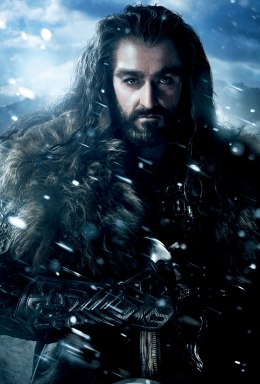
Thorin Oakenshield—technically Thorin II*—is the one dwarf you won’t forget. He’s the leader of the company that disrupts Bilbo’s pastoral idyll in the Shire en route to reclaiming his people’s home under the Lonely Mountain. As you find out early in The Hobbit film, this gold-rich kingdom (also known as Erebor) was lost to the fearsome fire-drake Smaug. In his Unfinished Tales, Tolkien describes Thorin as an “heir without hope,” hardened by both despair and rage. “The years lengthened,” Tolkien writes, and “the embers in the heart of Thorin grew hot again, as he brooded on the wrongs of his House and of the vengeance upon the Dragon that was bequeathed to him.”
Played by a frowning Richard Armitage, Thorin in The Hobbit draws immediate comparison to Viggo Mortensen’s Aragorn in the earlier LoTR movies— yet another scion of a glorious bloodline reduced to skulking in shadows. Thorin earned the sobriquet “Oakenshield” at the Battle of Anulbizar—an epic dwarf vs. orc bloodbath at the gates of the greatest lost dwarf kingdom, Moria—where, amid the clash of blade and axe, he was forced to defend himself with a splintered oak trunk. The dwarves won that fight, but lost half their numbers, including their king Thror, Thorin’s grandfather. His father, Thrain II, wanders off, half-crazy, and, as we learn in Tolkien’s appendices, is captured and tortured by the über-evil Sauron. Thorin leads his dwarves to settle in the Blue Mountains northwest of the Shire, but never shakes the tug of his eastern birthright and his hatred for the dragon who stole it. He intones in the first chapter of Tolkien’s The Hobbit: “Far over the misty mountains grim/ To dungeons deep and caverns dim/ We must away ere break of day/ To win our harps and gold from him.”
*Thorin I is six generations Thorin II’s elder; he was King under the Lonely Mountain before choosing to abandon it to colonize another set of mountains (descendants would return). This is where it gets even more complicated: their whole bloodline is descended from the kings of the greatest dwarf kingdom, Khazad-Dum, also known as Moria, which we see in The Fellowship of the Ring and which was lost to that ancient demon of the deep, the Balrog. The dwarves, for Tolkien, offer a cautionary moral tale: their insatiable greed and lust for the treasures of the earth serve only to bring evil upon them.
